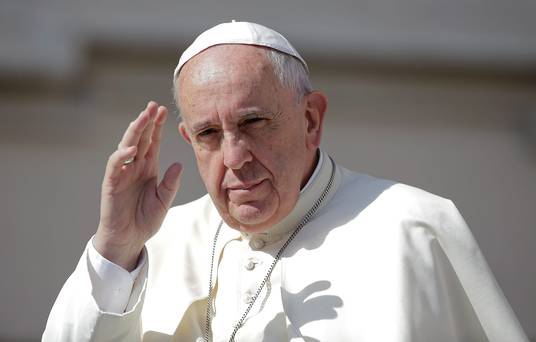Pope Francis: ‘Earth looks like immense pile of filth’
Former President of Ireland Mary Robinson: Pope Francis is looking for the solidarity the world had 70 years ago

Former President of Ireland Mary Robinson has described the Pope's environmental message as 'strong' and 'timely'....
Ms Robinson said the Pope Francis is looking for the solidarity the world had 70 years ago.
The former president was responding to Pope Francis' calls for swift action to save the planet from environmental destruction, saying “our home” the earth is “beginning to look more and more like an immense pile of filth”.
Speaking to RTE Radio One's Morning Ireland, Ms Robinson said: “The Pope clearly believes we have to address these issues.
“He talks about the ecological debt that the northern hemisphere owes the developing countries. It is a strong statement and an incredibly timely one.
“It is an important year, it is 70 years after 1945 when we got the charter of the United Nations and the IMF World Bank was established and we had the Marshall Plan.
“The Pope is looking for this type of solidarity and he is calling for it now.”
Speaking about the upcoming US Presidential election, the former President said climate change is not an issue the candidates can ignore.
“All candidates will be influenced by this statement, this is a message to everybody as the Pope said.
“And not just of Catholic belief, but also the evangelical community, which has a great amount of power in the States.
“This is a strong message about the responsibility we have – this part of nature is crying out.
“I don’t think any candidates can ignore this, this is a debate that will go on.
“This will change the narrative on climate, when such a powerful moral voice has spoken.”
In a stark message to the world’s population, Pope Francis rounded on politicians for failing to show leadership, and asked was it realistic for a business sector “obsessed with maximising profits” to “reflect on the environmental damage which they will leave behind for future generations”.
In the first papal document dedicated to the environment, he called for “decisive action, here and now” to halt further degradation and global warming.
He said the science showed that climate change was caused by human activity, and called for a change in lifestyles and a move away from a consumerist culture which was making the earth “less rich and beautiful…even more limited and grey”.
The papal encyclical “Laudato Si (Praise Be)” says that politics and business have been “slow to react” to the crisis. His comments come in advance of a key UN climate summit in Paris later this year, where it is hoped to secure global agreement on tackling climate change.
“It is remarkable how weak international political responses have been,” the Argentine-born pontiff said.
“There are too many special interests, and economic interests easily end up trumping the common good and manipulating information so that their own plans will not be affected.
“We lack leadership capable of striking out on new paths. The establishment of a legal framework which can set clear boundaries and ensure the protection of ecosystems has become indispensable.”
The comments from the 78-year-old pontiff, who took his name from St Francis of Assisi the patron saint of ecology, are sure to anger conservatives and climate sceptics who believe he is stepping into the realm of science and politics.
But he defended his stance, saying the Church did not presume to “settle scientific questions or to replace politics”, adding he wanted to encourage an “honest and open debate”.
He also argued against relying on technology to solve the problem of environmental destruction. He said a person who could afford to spend and consume more but who “regularly uses less heating and wears warmer clothes” showed the kind of convictions which would help protect the environment.
He also dismissed the system of carbon credits, or permits which allow the holder to emit one tonne of carbon dioxide and can be traded on the international markets. He said the system appeared to provide a “quick and easy solution” which could lead to a “new form of speculation”, but did not allow for the “radical change which present circumstances require”.
The document also focused on the poor, saying they were the ones most affected by climate change and pollution at a time when others had “not the faintest idea of what to do with their possessions”.
But he added that all was not lost. “Human beings, capable of the worst, are also capable of rising above themselves, choosing again what is good and making a new start”.
The encyclical was welcomed by the United Nations Development Programme, which said the poor and marginalised were the ones who are the most vulnerable to climate change, and the ones hardest hit by its impacts.
Aid agency Trocaire said the “unprecedented intervention” would have a positive impact on the vital climate negotiations this year.
An Taisce added that the Pope’s message was “highly relevant to Ireland”, and was a reminder of the “urgent and compelling need” for courageous political leadership.
Irish Independent
© Independent.ie